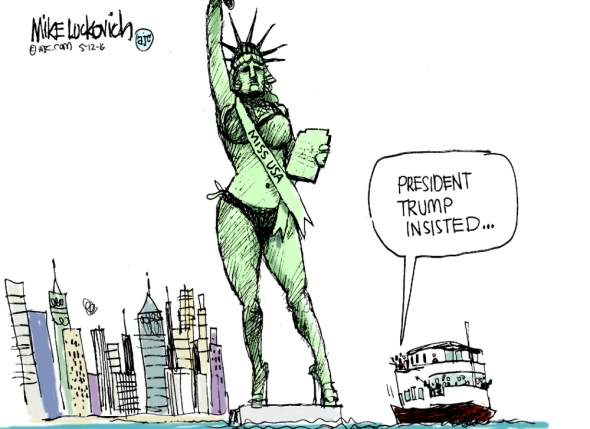Politics
Don't feed the troll
Law and order
NYT: Women who voted for Trump
Some insight into women who voted for Trump.
“I think he’s a really good man, deep down. This guy has such potential, and I truly believe he cares about our country and wants to help everyone.”
Well, by everyone, you mean “those exactly like me.” Actually, how about “just me”.
“But I had an 8-year-old who was totally on the Trump train. He talked me into taking him to a Trump rally.”
Trumpku No. 1
President Trump insisted...
Original at truthdig.com
How to tell if you're being pandered to
You might be the subject of political pandering if:
1. Fear, uncertainty, and doubt are the main tricks in the politician’s kit.
A politician who never tires of scapegoating a feared group, or a feared outcome is undoubtedly pandering. Or a demagogue. Or both. Whether it’s Mexicans, or Jews, or Muslims, or gay people, they never seem to stop talking about why you should be afraid of someone or something.
Well that has a familiar ring to it
The U.S. has become well-rehearsed in its response to mass shootings. An event. The pondering over terrorism vs. generalized craziness. The outpouring of prayers and support. Then the internet outrage. And more internet outrage. More meme pictures about guns and love. More color-your-profile picture trends. Empty scripted responses from pious politicians. A week or two, then back to our regularly scheduled programming.
News flash: this isn’t getting better. It’s not going to get better.
Trump, the conspiracy theorist
One of the most striking features of the GOP front-runner is his special fondness for conspiracy theories. From the (non-existent) connection between vaccines and autism to the “real culprits” behind 9/11, he shows the typical clustered endorsement of multiple conspiracy theories.
The question about whether this a form of pandering or a genuinely held set of perspectives is interesting, though barely relevant. In the former case, the abandonment of reason to achieve a political goal is an egregious fault. In the latter case, it sheds considerable light on crucial decision-making capacities. Endorsement of conspiracy theories requires a set of cognitive biases that fundamentally hobble evidence-based decision making.
Scalia and the secret society
It was recently reported in the Washington Post that the late Supreme Court Associate Justice Antonin Scalia had ties to a secret society of hunters called the International Order of St. Hubertus and that several of the guests at the Texas ranch where Scalia died were members of this group.
Surely I’m not the only one that finds this a bit weird. A secret society of hunters? I don’t know the first thing about hunting but from I’ve seen, the only thing secret about hunting is sneaking up on an animal so you can kill it.





